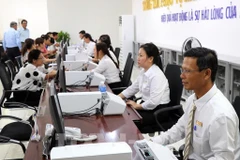Hanoi (VNA) – Workforce demand in Vietnam is growing as businesses gradually resume operations. But it is not an opportunity for everyone, as each employee must strive to adapt to new changes.
When the economy returns to normal, one of the Government’s top priorities will be to create jobs for the unemployed and ensuring supply for the labour market. To do this, both the Government and enterprises must offer training to workers.
This announcement came during a teleconference on international experience in job creation and sustainable business in the ‘new normal’ condition, co-organised by the Ministry of Labour, Invalids and Social Affairs (MoLISA) and the Manpower Group Vietnam on June 3.
Three scenarios for Q3 labour market
COVID-19 has posed unprecedented challenges to the labour market. In just the first five months of 2020, over 430,000 people applied for unemployment benefits, up 28 percent annually. In May, nearly 160,000 applied for unemployment insurance premiums, up 55 percent month-on-month and 45 percent year-on-year.
However, job suspension is decreasing as many firms begin hiring workers again. Deputy Minister of Labour, Invalids and Social Affairs Le Van Thanh said since May, on average 70,000 – 80,000 workers across the country have returned to work each month. Though unemployment rates have fallen, workers and enterprises still meet difficulties due to the stagnation in export markets and the changing habits of consumers.
Deputy head of the MoLISA’s Department of Employment Nguyen Thi Quyen said the department devised three scenarios for the labour market in the third quarter. If the world’s epidemiological situation improves, about 70-75 percent of businesses will be affected, about 70,000 – 80,000 lose jobs and 3-3.5 million others have to stop working.
If the situation goes flat, 80,000 – 90,000 people will lose their jobs, nearly 80 percent of firms be hit and 5-5.6 million suspend working.
If it the situation worsens, Vietnam will be seriously hit. Around 90,000 – 100,000 will lose their jobs each month, 90 percent be impacted and 6-7.2 million have their jobs suspended.
Commenting on the labour market during this period, General Director of Manpower Group for Thailand, Vietnam and the Middle East Simon Matthews said according to statistics from job transaction floors, sectors such as electricity, electronics, food and beverages, transportation, e-commerce, logistics, fast consumer goods and supply chains are thriving in the second quarter.
Retraining workers for new markets
Sharing experience in coping with COVID-19 impact in Singapore, Malaysia and Thailand, General Director of Manpower Group Malaysia and Director of Temporary Workforce Supply Services for Asia-Pacific Sam Haggag said a series of industries like aviation, ground and ride-hailing services made great efforts to reallocate workforce. In a new condition, return to the jobs market is a disciplined way to restore the economy.
 Experts talk at a teleconference on international experience in job creation and sustainable business in new normal conditions
Experts talk at a teleconference on international experience in job creation and sustainable business in new normal conditions
In sectors like ride-hailing services, logistics and fast-moving consumer goods in Malaysia, workers are regularly rotated to different units in a company. The reallocation of workforce and retraining help firms save recruitment costs, said Haggag.
Regarding changes to the labour market, Matthews said nearly half of the positions in the manufacturing sector must be changed in the next 3-5 years due to impact of digital transformation. The digitalisation of manufacturing requires better skills. In particular, positions requiring skills such as automation, tool manufacturing and robotics will increase in the next three years due to technological impact.
He added that 84 percent of entities are expected to improve workers’ skills this year. Therefore, they need to take new approaches to training to harness their competitiveness. Recruiters need to outline recruitment strategies and take a more creative approach to workers.
Deputy Minister Thanh said workforce demand is likely to rise but it is not an opportunity for all if each worker fails to reach his full potential. They must meet new requirements.
He added that the Vietnamese Government plans to allocate 3-5 trillion VND (130 – 217 million USD) from the unemployment insurance fund to support firms in workforce training. It is one of the measures to help workers adapt to new changes to the labour market due to impact of the pandemic./.





























